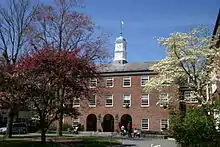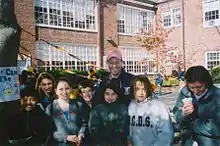Beaver Country Day School
Beaver Country Day School is an independent, college preparatory day school for students in grades 6 through 12 founded in 1920. The school is located on a 17-acre (69,000 m2) campus in the village of Chestnut Hill, Massachusetts, near Boston. Beaver is a member of the Cum Laude Society, the Independent Curriculum Group, and the National Association of Independent Schools. Beaver is accredited by the New England Association of Schools and Colleges.
| Beaver Country Day School | |
|---|---|
 | |
| Location | |

| |
| , United States | |
| Information | |
| Type | Independent |
| Motto | Mente et Manu (With Mind and Hand) |
| Established | 1920 |
| Head of School | Kimberly Samson |
| Faculty | 122 |
| Enrollment | 491 |
| Average class size | 15 |
| Student to teacher ratio | 4:1 |
| Campus | 17 acres (69,000 m2) |
| Color(s) | Blue and gray |
| Athletics | 18 sports |
| Athletics conference | Eastern Independent League (EIL) |
| Mascot | Beaver |
| Publication | The Heliconian (literary journal) |
| Newspaper | The Beaver Reader |
| Yearbook | The Beaver Log |
| Tuition | $51,925 (2019–2020) |
| Website | www.bcdschool.org |
History

Beaver was incorporated as an elementary school and an all-girls' high school in 1920 by a group of parents who were interested in progressive education and the Country Day School movement.
The school took its name in Boston, where some of the founders had been involved with a school for younger children later referred to as "Little Beaver." In an amusing historical chain, it seems that Beaver Place was possibly named for the Beaver, one of the ships of the Boston Tea Party; the ship—a Nantucket trading vessel owned by Joseph Rotch—was in turn named for the North American beaver, the rodent whose pelt was valued in Europe as a source of felt for high-quality hats. Thus, the "how did the school get its name?" question has a convoluted answer.
Beaver's first head of school was Eugene Randolph Smith, a progressive educator and a follower of the educational reformer John Dewey; Smith had previously been head of the Park School of Baltimore. The school opened in a facility in Brookline, and moved to the present Chestnut Hill campus in the mid-1920s. Crosby Hodgman succeeded Smith as headmaster in 1943 and led the school until 1967, when Donald Nickerson became head. Nickerson resigned in 1973 and was succeeded by Philip E. McCurdy. McCurdy's successor, Jerome B. Martin. led the school from 1985 until 1992, when the current head of school, Peter R. Hutton, took over. Peter Hutton will step down in June 2020, and Kim Sanders will take over as Head of School.
From the 1930s into the early 1940s Beaver was part of the Eight-Year Study, an educational experiment to test the efficacy of progressive education. The school adopted coeducation in 1971.
Painter Beatrice Van Ness founded the art department at the school in 1921 and remained on the faculty until 1949.[1]
Students

Beaver offers grades 6 through 12. Enrollment (2019-2020) is 491 students, of whom 355 are in the upper school (grades 9–12) and about 136 are in the middle school (grades 6–8). Classes average about 15 students; one hundred percent of Beaver graduates go on to four-year colleges and universities. The school community is diverse, with students coming from over 60 towns in the metropolitan Boston area and speaking 20 languages besides English at home. About 25% of students and 25% of faculty are of color. Twenty-five percent of students receive financial aid. Tuition for the 2019-2020 academic year for all grades was $51,925.[2]
Beaver is a part of the Eastern Independent League and fields interscholastic teams in sailing, soccer, field hockey, golf, cross country, basketball, fencing, volleyball, wrestling, squash, baseball, softball, tennis, ultimate, and lacrosse. In winter of 2011–2012, Beaver started competing in girls' ice hockey. In 2015–2016, the school added boys' ice hockey as a part of their athletic program. In 2018, the school added co-ed sailing as well.
Notable alumni
- Tenley Albright, physician and winner of the 1956 Olympic Gold Medal in Ladies Figure Skating
- Jane Alexander, stage and film actor and former chair of the National Endowment of the Arts
- Carol Beckwith, photographer, artist, and co-author (with Angela Fisher) of Maasai, African Ceremonies (2 vols.), African Ark, Nomads of Niger, and Passages, and winner of awards from Explorers Club, UN, and Royal Geographical Society of London.
- Eliza Dushku, actress most noted for her roles as Faith in Buffy the Vampire Slayer and Angel and as Echo in Dollhouse
- Brad Falchuk, co-creator, executive producer, writer, and director of Glee; co-creator, executive producer, and writer on "American Horror Story;" writer on Nip\Tuck
- Jeffrey Finn, Broadway producer, nominated for 2005 Tony Award for Best Revival of a Play for On Golden Pond
- Lucinda Franks, journalist and winner of a Pulitzer Prize
- Temple Grandin, created humane cow slaughtering device. Also noted for overcoming the barriers of her autism.
- Joyce Ballou Gregorian, 1963, author
- Tammy Grimes, stage and film actress who originated the title role in The Unsinkable Molly Brown on Broadway
- Fanny Howe and Susan Howe, poets and sisters
- Jan Miner, stage actress who gained fame as Madge, the manicurist in Palmolive television ads
- Matt Selman, writer and producer for The Simpsons
- Wayne Turner, former University of Kentucky basketball star and professional basketball player
- Zachary Herivaux, soccer player on the New England Revolution
- Sammy Adams, rapper, singer, songwriter
References
- Archives of American Art. "Summary of the Beatrice Whitney Van Ness papers, 1883–1985 – Archives of American Art, Smithsonian Institution". Retrieved 25 March 2016.
- "Beaver Country Day School Admissions". Missing or empty
|url=(help)